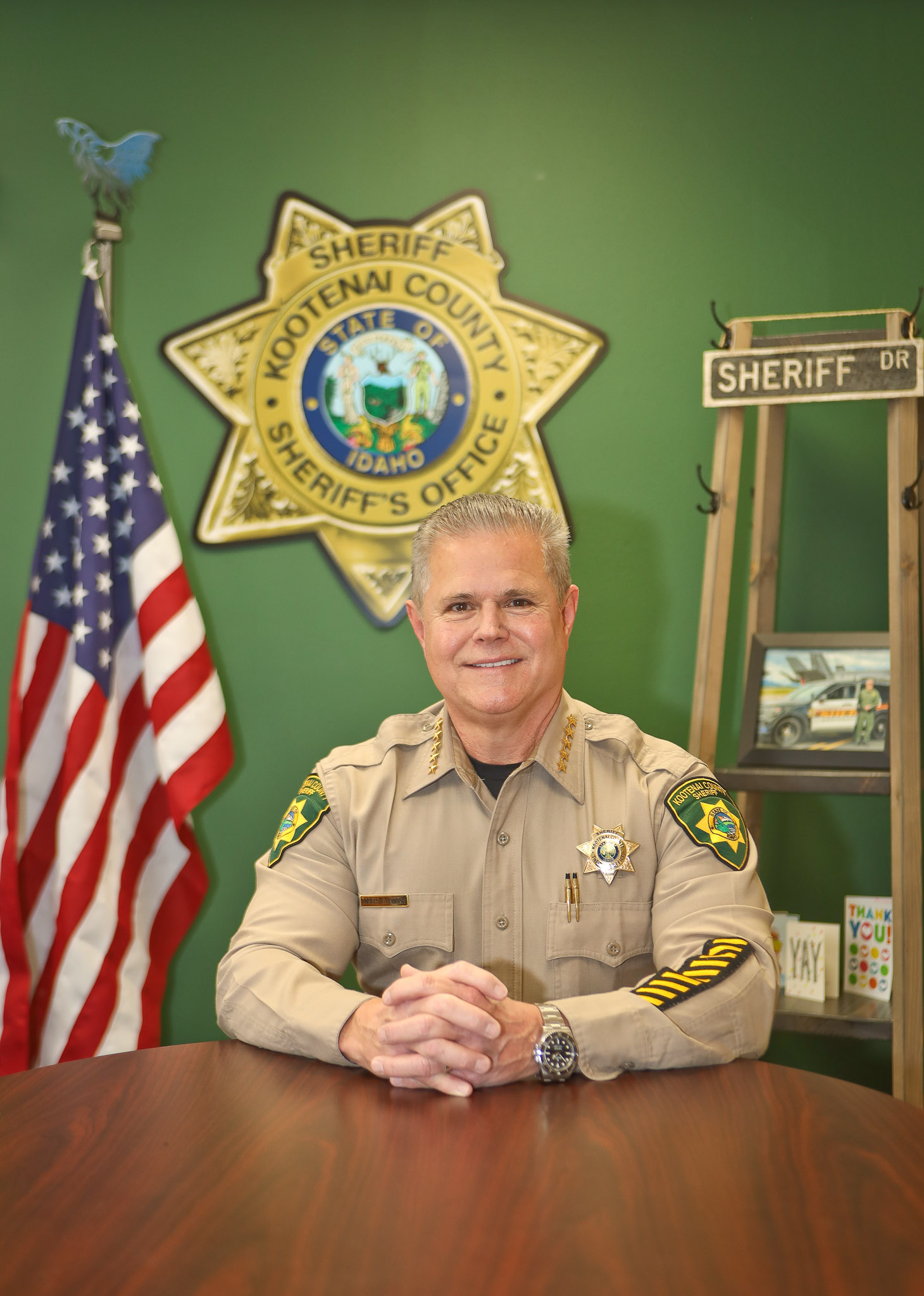COEUR d’ALENE, Idaho — At a regularly scheduled business meeting on December 23, the Kootenai County Board of Commissioners shifted from a limited pilot program to a one-year contract with Motorola that expanded the county’s use of Automatic License Plate Recognition (ALPR) cameras and software. According to Undersheriff Brett Nelson, 48 marked sheriff vehicles are now operating with ALPR capabilities. “This is not our entire fleet of marked vehicles and does not include our unmarked vehicles,” stated Nelson.
The contract was approved in a 2-1 vote, but was not without controversy, which included a public spat between Commissioner Leslie Duncan and Sheriff Bob Norris. The tension between the elected officials culminated at the business meeting where Norris responded to an undated open letter from Duncan to local legislators. “It was you, Commissioner Duncan, who approved this technology in 2019,” stated Norris. “And not once did you contact me or the sheriff’s office to follow-up on the technology that you approved…when it comes to civil liberties, we—you and I—should be working together to protect people’s rights.”
“Are you finished?” responded Duncan. “Were you purposefully hiding something from me?” she asked regarding a public record request she submitted seeking a draft policy relating to the ALPR program.
The two officials had a brief back-in-forth where Duncan asserted there are legal issues with public record disclosures and Norris refuted that by stating the technology is in wide use across the state and none of the 44 counties in Idaho have given out data collected from ALPR programs.
“Our attorneys said that it is not subject to public record requests,” stated Norris. “Did you consult an attorney before you wrote this letter?”
“Let’s just say I brought it to someone’s attention, but not in an official capacity,” replied Duncan. She requested the contract to be “pushed off” in order for her to review the sheriff’s policy and for legal to review the contract.
Commissioner Bruce Mattare said he reviewed the sheriff’s policy and believes it addresses the concerns Duncan raised in her letter. “This policy manual addresses your issues and more,” stated Mattare. In reference to her letter, Mattare encouraged Duncan to source studies if she continues to reference them in her communications so that the studies can be understood and taken seriously. “I share your concerns, Commissioner Duncan,” continued Mattare. “I am against the surveillance state.”
Watch the full exchange between the officials about the ALPR technology here, starting at minute 43:35.
August 2024: The first public controversy over the ALPR program.
The controversy first began when failed Independent Sheriff Candidate Dan Wilson turned a routine public hearing to approve the county’s 2025 fiscal year budget into a platform for political activism. Wilson and his supporters attempted to strip the proposed Motorola contract to operate the ALPR cameras that the county already owned from the budget. The public comments that took place at the August 28 hearing made it clear to Sheriff Norris that an informative discussion on the technology was needed to help the community better understand its capabilities, applications, and safeguards.
“I am uncomfortable with the misinformation,” Norris told Kootenai Journal immediately following the budget hearing. “I want to embark on a series of town halls to educate the public and earn their trust for this important tool before full implementation of the program. I want to assure the public that the data is secure and shielded from exploitation by federal entities.”
November 2024: Town hall hosted by Commissioner Duncan propagated misinformation about the ALPR technology.
Norris scheduled his first “Crime-Fighting Technology” town hall to address concerns relating to license’s plate readers for December 17. However, before that event could take place, Duncan scheduled a town hall titled “Technology Ramifications: Civil Liberties Today” for November 19. According to Norris, Duncan’s two and a half hour town hall was full of misinformation about the ALPR program. “I am ashamed that we have elected officials in this county who would allow so much misinformation to occur and mislead its good citizens,” Norris said in his opening comments at the Dec. 23 business meeting.
During the Nov. 19 town hall, RJ Garwood, a county resident and Motorola employee, spent a significant amount of time trying to bridge the information gap about the program. He addressed the difference between traffic cameras and ALPR cameras, as well as the capabilities of different forms of software and applications of stationary versus mobile cameras. He also spoke about the differences between commercial and government data storage contracts. “The policy is up to the sheriff’s department, we have hundreds of agencies throughout the United States that have LPR cameras and policies,” stated Garwood. “I have been with Motorola for about a year and a half…I retired after 27 years as a police officer…I used the technology as a police officer and have intimate knowledge of how it works.”
Kootenai Journal asked Duncan six clarifying questions about the initial pilot program, the data retention policy at the time the program was approved, and whether the board of commissioners requested an audit of the program. Duncan responded that the initial program, which she voted to approve along with former Commissioner Chris Fillios in May 2019, was funded by a federal grant known as Stonegarden, that the county did not review a data retention contract or any ALPR policy from former Sheriff Ben Wolfinger, nor was she aware of any county request for an audit of the program in the past five years. When asked if the county had any policies or procedures in place to audit new programs, Duncan replied, “Not that I can think of.”
December 2024: Town hall hosted by Norris explains the origin and application of ALPR technology and corrects misinformation.
During the Dec. 23 meeting, Norris called ALPR a “great crime prevention tool” and asserted that “no breach of the data” has occurred in the past 16 years in which the county has maintained a Memorandum of Understanding with other law enforcement entities.
At Norris’ Dec. 17 town hall, former Post Falls Police Chief Scot Haug explained the historical context of ALPR technology in Kootenai County. In 2006, Haug was asked by his chief at the time to research a new law enforcement technology that Paul Harvey had talked about on his radio program. “At that time in Post Falls, we were seeing explosive growth, similar to what we’ve seen in the last couple of years,” Haug said. “We were trying to use technology to keep up with the growth…we were expected to do more with less.”

Haug applied for a grant from the Department of Homeland Security at the state level. “It was a collaborative grant between the Kootenai County Sheriff’s Department, the Coeur d’Alene Police Department, and the Post Falls Police Department,” he stated. The $150,000 grant brought four fixed and three mobile ALPR cameras to the county.
“We installed cameras out at the Stateline…we were getting Spokane residents coming in the middle of the night and burglarizing our citizens, they were stealing [and] committing robberies,” Haug continued. “They were victimizing us…what a great way, as a force multiplier, to be able to use technology to alert us when a bad guy was coming into town.”
“It was a homerun for us,” stated Haug. “We were solving crimes left and right.”
On Dec. 17, Norris corrected the misinformation about the ALPR program by discussing how:
- The camera only “reads” the letters and numbers of license plates and stores the numerical and alphabetical plate data with the date, time, and location of the “reading.”
- The camera and software has no facial recognition capabilities.
- There is no live stream of any information.
- The camera does not take pictures of drivers.
- The plate is compared to a “Hot List” composed of license plates with a criminal nexus or civilian alert, like a missing person or an Amber or Silver Alert.
- The data is stored and secured for criminal investigations.
- The data is owned by Kootenai County and is never sold. Motorola contracts for law enforcement are not the same as those for commercial users.
- The software can not predict vehicle location, nor can it “read” through walls/garages.
- There are stringent controls over access to the data.
- Audits are performed to ensure access of the data is within the bounds of the law.
- It is a criminal offense if access to the data is abused and offenders face up to one year in prison.
To address concerns about the potential abuse of the data, Prosecutor Stanley Mortensen assured the community that his office would take action if any law, including technology abuses, were investigated and sent to his office. “I’m not going to ignore it,” he stated.

Norris and Mattare also made it clear that the claim of red-light cameras put forth at Duncan’s Nov. 19 town hall by a member of the public was completely false. “We have no red-light cameras here in Kootenai County,” Norris stated. “And I would not support any red-light cameras.”
The retention of the data was a bone of contention between elected officials and the public. The sheriff’s recently adopted ALPR policy states, “All ALPR information contained within KCSO’s ALPR system will be stored for a period not to exceed one year. After one year, the information will be automatically purged (i.e., permanently removed from the system).” Duncan believes the one year retention of data is “excessive.”
Duncan was first sworn into office in January 2019, she will begin her third term on January 13, 2025. Norris was first sworn into office in January 2021, he will begin his second term on January 13, 2025. The current Automated License Plate Reader (ALPR) Use and Retention Policy Manual can be found on the Kootenai County Sheriff’s official website kcsheriff.com.







